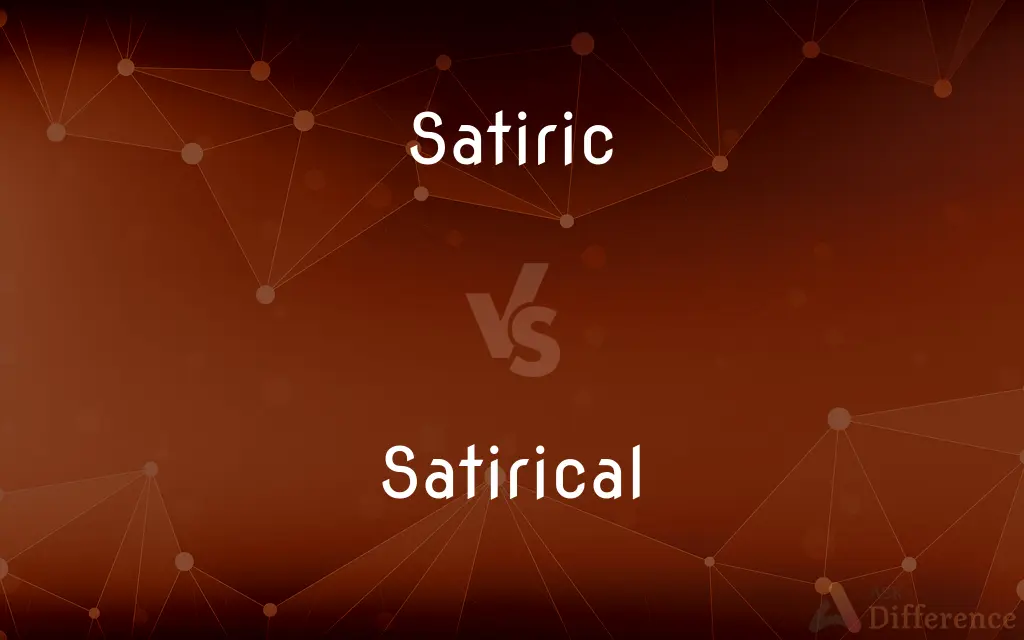Satiric vs. Satirical — What's the Difference?
By Maham Liaqat & Urooj Arif — Updated on April 6, 2024
Satiric and satirical both relate to satire, but "satirical" is more commonly used to describe something that employs satire.

Difference Between Satiric and Satirical
Table of Contents
ADVERTISEMENT
Key Differences
Both "satiric" and "satirical" pertain to satire, a genre of literature, art, or performance that uses humor, irony, exaggeration, or ridicule to criticize or expose flaws in society, individuals, or institutions. The main difference between the two adjectives lies in their usage rather than their meaning, with "satirical" being more frequently used in contemporary English to describe works or expressions embodying the qualities of satire.
Satiric works aim to highlight and criticize societal vices, follies, abuses, or shortcomings, often with the intent of shaming individuals, corporations, government, or society itself into improvement. Satirical, on the other hand, also characterizes works with these intentions but is more commonly applied across various contexts, suggesting a slight preference in modern usage for describing such efforts.
In literature, a "satiric" piece might focus sharply on specific targets with the aim of moral correction, using wit as a weapon against perceived misconduct or moral failings. "Satirical" literature, while also engaging in these critical examinations, often emphasizes the humorous or ironic elements more broadly, appealing to a wider audience through its entertaining critique.
Usage trends show that "satirical" is often chosen to describe works in visual and performance arts, including films, television shows, and cartoons, that employ satire. Meanwhile, "satiric" might appear more frequently in academic discussions or analyses, particularly when referring to the classical tradition of satire in literature.
Despite these nuances in usage, the distinction between satiric and satirical is not strictly observed, and they are largely interchangeable. The choice between them often comes down to personal preference or stylistic considerations in writing.
ADVERTISEMENT
Comparison Chart
Definition
Relating to satire, often with a focus on moral correction
Relating to satire, emphasizing humor or irony
Common Usage
May appear more in academic or classical contexts
More frequently used in contemporary contexts
Target
Specific societal vices or follies
Broadly criticizes societal flaws through humor
Literature
Sharp, focused criticism
Humorous, ironic critique
Arts
Used to describe classical and literary satires
Often applied to visual arts, films, and performance
Compare with Definitions
Satiric
Literary Focus.
The play's satiric tone underscored its critique of political corruption.
Satirical
Humorous Critique.
The film's satirical portrayal of consumer culture won several awards.
Satiric
Classical Tradition.
Satiric poetry often targets societal follies with the aim of reform.
Satirical
Entertainment.
The television show uses satirical sketches to critique societal norms.
Satiric
Targeted Criticism.
The essay employed a satiric approach to expose the absurdity of modern office culture.
Satirical
Visual and Performance Arts.
Her art exhibit featured satirical sculptures critiquing environmental negligence.
Satiric
Academic Usage.
Scholars frequently analyze the satiric methods used in 18th-century literature.
Satirical
Broad Application.
Satirical cartoons in the newspaper comment on current events with humor and irony.
Satiric
Moral Correction.
His satiric articles were known for their sharp wit and moral insight.
Satirical
Contemporary Usage.
His blog is known for its satirical take on the day's news.
Satiric
Of, relating to, or characterized by satire.
Satirical
Containing or using satire
A New York-based satirical magazine
Satiric
Given to or fond of making satirical remarks.
Satirical
Of, relating to, or characterized by satire.
Satiric
Of or pertaining to satire
Satirical
Given to or fond of making satirical remarks.
Satiric
Of or pertaining to satire; of the nature of satire; as, a satiric style.
Satirical
Of, pertaining to, or connected with satire
Spitting Image was a famous satirical television program.
Satiric
Censorious; severe in language; sarcastic; insulting.
Satirical
Exposing human folly to ridicule;
A persistent campaign of mockery by the satirical fortnightly magazine
Satiric
Exposing human folly to ridicule;
A persistent campaign of mockery by the satirical fortnightly magazine
Common Curiosities
How do satiric and satirical works engage with their audience?
They engage audiences by blending criticism with entertainment, making complex or uncomfortable subjects more accessible and thought-provoking through humor.
Why choose satirical over satiric, or vice versa?
The choice often depends on usage trends, personal preference, or the context in which the work is discussed. "Satirical" is more commonly used in contemporary settings.
How do satirical works influence society?
Satirical works can influence society by sparking discussions, challenging prevailing norms, and encouraging critical thinking about cultural, political, and social issues.
What are common techniques used in satiric and satirical writing?
Common techniques include exaggeration, parody, irony, sarcasm, and juxtaposition to highlight the absurdity or hypocrisy of the subject matter.
What is the purpose of satiric and satirical works?
Both aim to criticize and expose societal flaws through humor, irony, and exaggeration to provoke reflection or change.
Can a work be both satiric and satirical?
Yes, since the terms are largely interchangeable, a work can be described using either adjective, depending on the context or preference.
Are satiric and satirical works always funny?
While humor is a key element, the effectiveness of satire comes from its insightful critique, not just from being funny. The humor often serves a deeper purpose of critique or reflection.
Can satire bring about real change?
While satire alone may not bring about change, it can be a powerful tool for raising awareness and stimulating discussion, potentially influencing public opinion and policy.
How do satiric and satirical works differ from straightforward criticism?
They differ by incorporating humor, irony, and exaggeration to critique, making the commentary more engaging and reflective rather than direct and confrontational.
Can satire be considered offensive?
Yes, satire can be considered offensive by some, especially if the subject matter hits close to home or if the satirical critique is misunderstood.
How has the role of satire evolved in the digital age?
In the digital age, satire has found new platforms and audiences through social media, blogs, and online videos, allowing for immediate and widespread dissemination but also raising concerns about misinterpretation and the spread of misinformation.
How do satirical works handle sensitive or controversial topics?
Satirical works handle sensitive topics by balancing humor with insight, often walking a fine line to provoke thought without crossing into insensitivity or cruelty.
What challenges do creators of satiric and satirical content face?
Creators face the challenge of crafting their critique in a way that is both humorous and insightful, navigating the risk of offense, and dealing with the possibility of censorship or backlash.
Why might a writer choose satire over other forms of critique?
Writers might choose satire to engage their audience more effectively, using humor to soften the delivery of potentially harsh critiques or to reach a wider audience by making complex issues more accessible.
What role does audience perception play in the effectiveness of satire?
Audience perception is crucial; effective satire requires the audience to recognize and appreciate the underlying critique, which can vary widely among different cultures and individuals.
Share Your Discovery

Previous Comparison
Jo vs. Joe
Next Comparison
Arbalest vs. BallistaAuthor Spotlight
Written by
Maham LiaqatCo-written by
Urooj ArifUrooj is a skilled content writer at Ask Difference, known for her exceptional ability to simplify complex topics into engaging and informative content. With a passion for research and a flair for clear, concise writing, she consistently delivers articles that resonate with our diverse audience.
















































